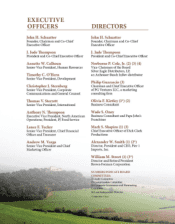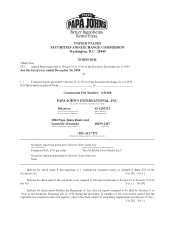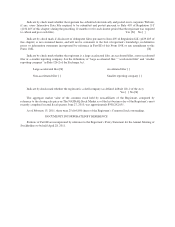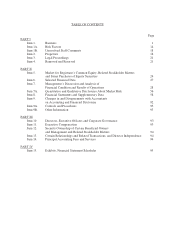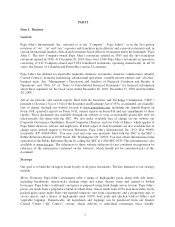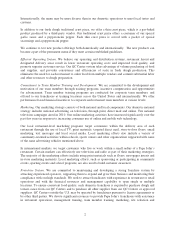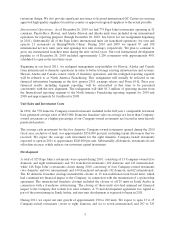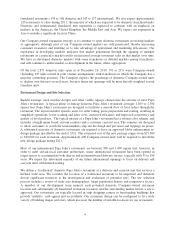Papa Johns 2010 Annual Report Download - page 12
Download and view the complete annual report
Please find page 12 of the 2010 Papa Johns annual report below. You can navigate through the pages in the report by either clicking on the pages listed below, or by using the keyword search tool below to find specific information within the annual report.5
“Non-traditional” Papa John’s restaurants do not generally provide delivery to a defined trade area but
rather serve a captive customer group on a continuous operation or an event-driven service (e.g.,
university food service, stadiums, entertainment venues, military bases, airports, etc.). Non-traditional
units are designed to fit the unique requirements of the venue.
We provide layout and design services and recommendations for subcontractors, signage installers and
telephone systems to Papa John’s franchisees. Our franchisees can purchase complete new store
equipment packages through an approved third-party supplier. In addition, we sell replacement
smallwares and related items to our franchisees.
QC Center System; Strategic Supply Chain Management
Our domestic QC Centers, comprised of nine full-service regional production and distribution centers
and one distribution-only center, supply pizza dough, food products, paper products, smallwares and
cleaning supplies twice weekly to each restaurant. This system enables us to monitor and control product
quality and consistency, while lowering food and other costs. Our full-service QC Centers are located in
Louisville, Kentucky; Dallas, Texas; Pittsburgh, Pennsylvania; Orlando, Florida; Raleigh, North
Carolina; Denver, Colorado; Portland, Oregon; Des Moines, Iowa; and Phoenix, Arizona. We also
operate a distribution-only center in Cranbury, New Jersey. The primary difference between a full-
service QC Center and a distribution-only center is that full-service QC Centers produce fresh pizza
dough in addition to providing other food and paper products used in our restaurants. The QC Center
system capacity is continually evaluated in relation to planned restaurant growth, and facilities are
developed or upgraded as operational or economic conditions warrant. We consider the current domestic
QC Center system capacity sufficient to accommodate domestic restaurant development for the next
several years without significant additional capital requirements.
We own full-service QC Centers in the United Kingdom; Mexico City, Mexico; and Beijing, China.
Other international full-service QC Centers are licensed to franchisees and non-franchisee third parties,
and are generally located in the markets where our franchisees have restaurants. We expect future
international QC Centers to be licensed to franchisees or non-franchisee third parties; however, we may
open Company-owned QC Centers at our discretion. We also have the right to acquire licensed QC
Centers from our international licensees in certain circumstances.
We set quality standards for all products used in our restaurants and designate approved outside suppliers
of food and paper products that meet our quality standards. In order to ensure product quality and
consistency, all domestic Papa John’s restaurants are required to purchase tomato sauce and dough from
our QC Centers. Franchisees may purchase other goods directly from our QC Centers or approved
suppliers. National purchasing agreements with most of our suppliers generally result in volume
discounts to us, allowing us to sell products to our restaurants at prices we believe are below those
generally available in the marketplace. Within our domestic QC Center system, products are distributed
to restaurants by refrigerated trucks leased and operated by us or transported by a dedicated logistics
company.
PJ Food Service, Inc. (“PJFS”), our wholly-owned subsidiary that operates our domestic Company-
owned QC Centers, had a purchasing agreement with BIBP Commodities, Inc. (“BIBP”), a third-party
entity formed by franchisees for the sole purpose of reducing cheese price volatility to domestic system-
wide restaurants through fiscal 2010. Under this agreement, PJFS purchased cheese from BIBP on a
monthly basis at the projected spot market price, plus a certain adjustment based on BIBP’s cumulative
financial position. Gains and losses incurred by BIBP were passed on to PJFS and therefore to Company-
owned and franchised restaurants through adjustments to the selling price. Over time, PJFS purchased
cheese at a price approximating the actual average market price, but with more short-term predictability.



